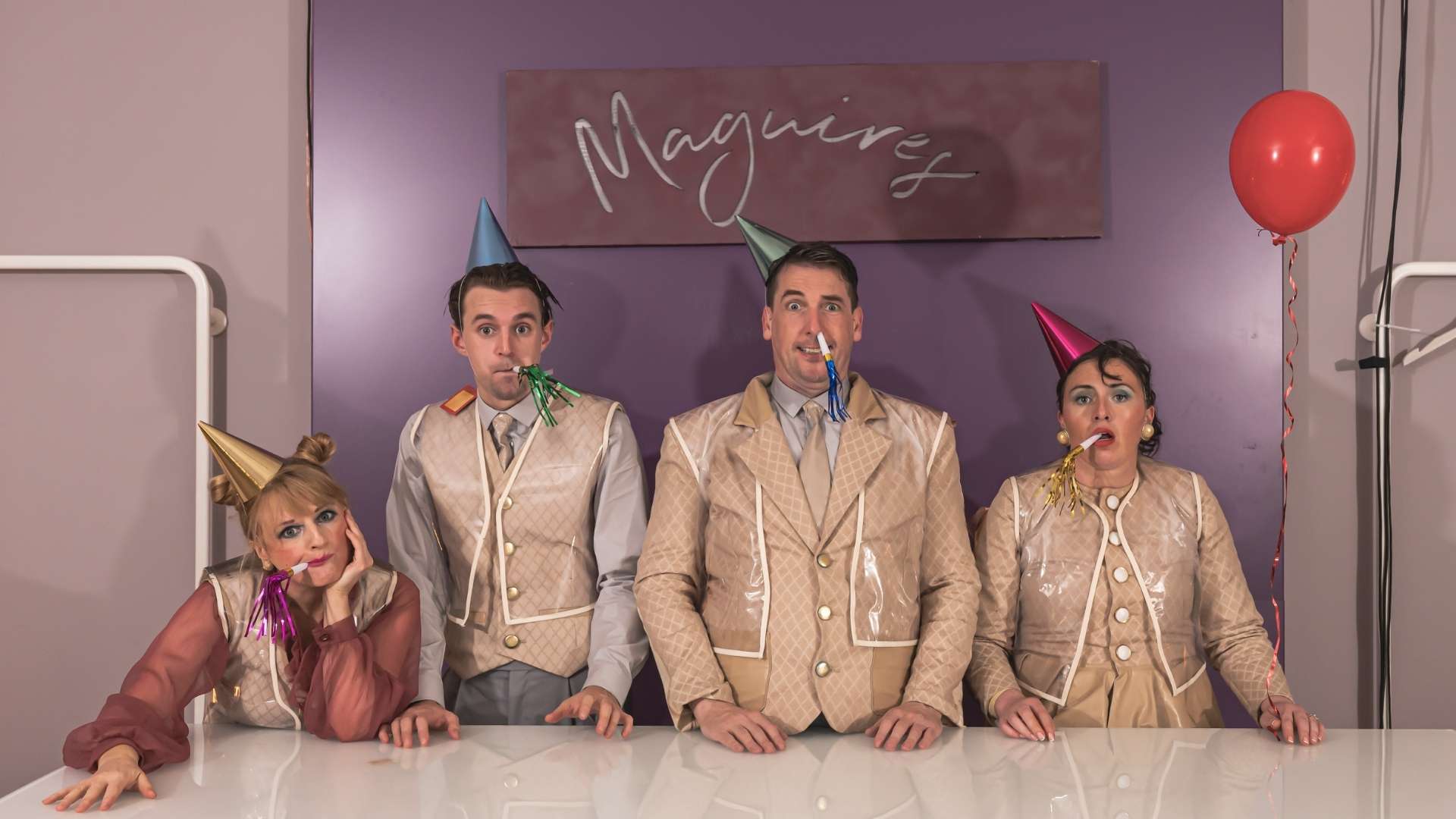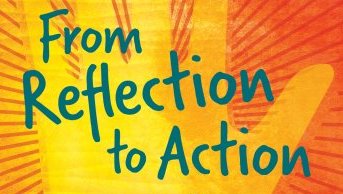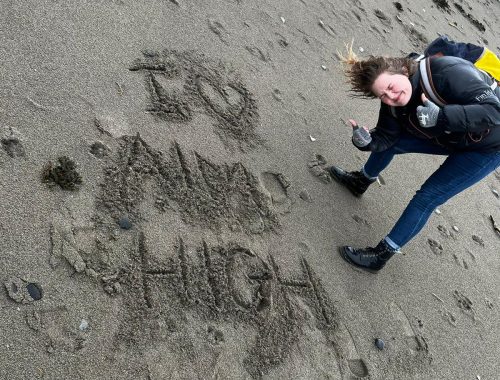Challenge the unexpected
I did not have many expectations going into my placement. I spent many disheartening weeks trying to find one, mostly unsuccessfully, and when I finally did, it was not in a film or TV production company – which was my original goal as it is the industry in which i wish to develop a career – but in a theatre company, the Big Telly Theatre Company. I do love theatre, and I thought, if I’m not going to find a placement on a set, I will at least be part of a creative project. I did not expect to take part in any relevant duties that would inform my choice of becoming a camera operator and a creative professional in the film industry. The month I spent working on the play Department Story proved me wrong on many levels. My placement in the Big Telly Company did present challenges, many of which I expected, but some who took me by surprise, and all were valuable learning experiences. I will reflect on these using Schön’s model [1] of the “Reflective Practicioner”.
[1]

How I felt then
The placement started in the beginning of October, when the rehearsal for the play began. It would be performed throughout the rooms of the former Bravissimo lingerie shop in the city centre of Belfast, which is where the rehearsals took place. I had told the producer about my interest in visual storytelling and they said I would be doing some camerawork at some point, as the play was to be a site-specific interactive live performance with online as well as in-person audiences for each performance.
In order to get the best out of your placement, it is essential that both you and your employer are clear as to what you will be doing, the hours you will be working, [and] the person to whom you will be responsible[…].
Christine Fanthome, 2004, p.50
I was not very clear as to what I would be doing exactly in this play, but I knew I would be there to assist them during rehearsals, and maybe film the performances later on for the online audience. The uncertainty of my duties were to be expected as this play was still in the early stages of production and everyone was extremely busy, which did not allow for a lot of time to go into detail about every aspect of the show. I decided to be as helpful as I could and try to make myself useful, despite the fact that I had never worked on a stage production before. I made the decision to throw myself in and enjoy this opportunity as much as I could.
You will learn simply by being in a workplace environment, putting your skills to practical use, observing others at work, taking instructions and reflecting upon your situation.
Christine Fanthome, 2004, p.71
[2]

Big Telly became a pioneer in producing hybrid shows with both physical and virtual elements as a result of the pandemic and its effects on the performing arts. The live element and digital technology added to the performance were however still in its testing stages, leading to a lot of uncertainty during the pre-production and rehearsals of the show. I was very much interested in learning more about the technology and how it would enhance the performances of the actors for the online audience without hindering the experience of the in-person audience, but the department they needed most assistance with was set-design and costumes. I was discovering first-hand the joys of live interactive storytelling in a pioneering show, but had to stand back and observe from afar in these first stages of production.
Clearly, the most important factors in student satisfaction with fieldwork are relevant learning experiences and supervision.
Anne E. Fortune et al., 1985, p.104
[3]
I was asked to create seats for the audience out of cardboard boxes, and spent entire days taping, filling and decorating these boxes [3]. At first, I was disappointed and a little bored to make these, as it was easy to assume that this would be the only useful duty I would be given for the remainder of the placement. These hours were long and physically challenging, in a room away from the rest of the cast and crew working on creative elements that seemed more relevant to what I wanted to learn. In the end, I realised that this was what I came to do, be a useful as I could, and if this was what was most needed from me at this point in production, I should not be discarding it as unimportant. Although this work was not directly relevant to my desired occupation, it was still a learning experience as I discovered that I was able to focus on and perform a physically demanding job for hours at a time. It was also interesting to shadow multiple people with different qualifications such as set or costume design [4], whom I would not have had the chance to properly meet had I narrowed my learning to visual technology only.
The key point to remember about a work placement is that, whatever happens, it is a learning experience. This applies whether the work is fulfilling or disappointing.
Christine Fanthome, 2004, p.71
[4]
The most challenging aspect of this placement was the moments I was left to my own devices. I would often arrive at the time agreed upon and spend an hour or so wandering around the set, making myself available to anyone that could require my help, but more often than not no one needed me for a while still. It was hard at first to understand where to go or where I was wanted, and it was even more difficult to accept that I would sometimes not be useful to anyone, either because they had it covered or they needed someone experienced to assist them.
It is embarrassing to be idle in a busy working environment when others seem fully occupied, and the effect is isolating.
Christine Fanthome, 2004, p.66
This led me to welcome any work I was given, whether it be set or costume design, or simply relaying information between departments. I was offered halfway through rehearsals to follow along the performances and film the actors live during the show with a phone they provided, a prospect I was very enthusiastic about. After a few days of hearing nothing more about it, I asked the stage manager when I would be able to practice, and I was told that this task would actually be given to the paid intern who had a small part in the play, as it would be less jarring for the audience to see him move around the actors during the show. This decision made sense for the coherence of the play but I was still quite disappointed as this role would have been perfect for an aspiring camera operator such as myself. I kept on doing the other tasks required while shadowing the technical department as much as I could. Finally, as the opening night came closer, the technical supervisor offered that I operate the ceiling-bound cameras [5] with a remote control. This was the creatively challenging role I had been waiting for, and I was thrilled to be given this responsibility.
[5]
I determined the best camera angles and framing for each part of the play on both floors, as the characters move throughout the shop during the show. I then practiced over and over during each rehearsal until I remembered every movement easily, and the technical supervisor was happy with my performance. Then came opening night. I was also to be ‘first steward’ for every performance, which entailed that I welcome the public at the entrance and usher them in, as well as be responsible for the health and safety of everyone inside the premises. I then had to discreetly go next to the correct cameras and operate them during the show, while trying to stay out of sight of both audiences. This job was physically and mentally challenging, but it was never boring and always fulfilling, as every show was different and as compelling as the last. It put my endurance to the test as I executed it for every performance, twice a day for two weeks. I found this experience incredibly useful, allowing me to practice my focus and resourcefulness as I had to remember my positions, and the placement and angle of each camera for every part of the two-hour long play, while thinking of ways to enhance the ever-evolving performance of the actors.
How I feel now
I experienced some disappointment in the tasks I was first given, but once I considered them as opportunities to learn instead of boring activities, I let myself enjoy them as new experiences and discovered my capacity to focus on physically and sometimes creatively challenging work while forging interesting professional relationships in creative departments I did not expect to engage in. I showed my motivation to work hard and be as useful as possible, and I was rewarded by being given more responsibilities and was allowed some creative input, through which I showed my ability to take creative decisions as well as proved my worth as a dependable and focused worker.
Individuals produce more creative work when they perceive themselves to have choice in how to go about accomplishing the tasks that they are given.
Teresa M. Amabile et al., 1996, p.1161
I really enjoyed being trusted with part of the responsibility of putting a live performance on screen, and the challenges that came with it. I delt with the tasks given by being adaptable under pressure and learning when and where to be useful in a busy creative environment. This experience will be extremely useful in my future endeavours in the film industry, as it presented challenges which I will most likely encounter again, and showed that I could deal with them adequatly given how little experience I previously had in theatre production.
Bibliography
Amabile, Teresa M., et al. “Assessing the Work Environment for Creativity.” The Academy of Management Journal, vol. 39, no. 5, Academy of Management, 1996, pp. 1154–84, https://doi.org/10.2307/256995.
Fanthome, Christine. Work Placements : A Survival Guide for Students. Palgrave Macmillan, 2004. EBSCOhost, https://search.ebscohost.com/login.aspx?direct=true&db=cat02616a&AN=qub.b16587510&site=eds-live&scope=site.
Fortune, Anne E., et al. “Student Satisfaction with Field Placement.” Journal of Social Work Education, vol. 21, no. 3, [Taylor & Francis, Ltd., Council on Social Work Education], 1985, pp. 92–104, http://www.jstor.org/stable/23043106.
Images
[2] https://eghcszbxego.exactdn.com/wp-content/uploads/2021/10/Department-Story-by-Big-Telly-Theatre-Company-L-R-Niamh-McGrath-Cillian-Leneghan-Chris-Robinson-Nicky-Harley.jpg
[3] self-made original picture
[4] self-made original picture
[5] self-made original picture
Reflective Essay 3 - Conor Meharg
You May Also Like

Reflection-In-Action: The Value of Challenges
25 March 2022
An Experience Never To Forget
1 April 2022
